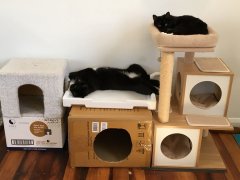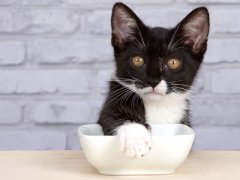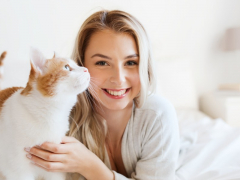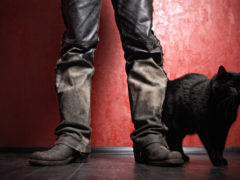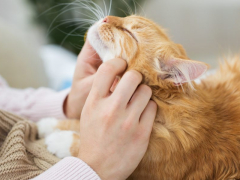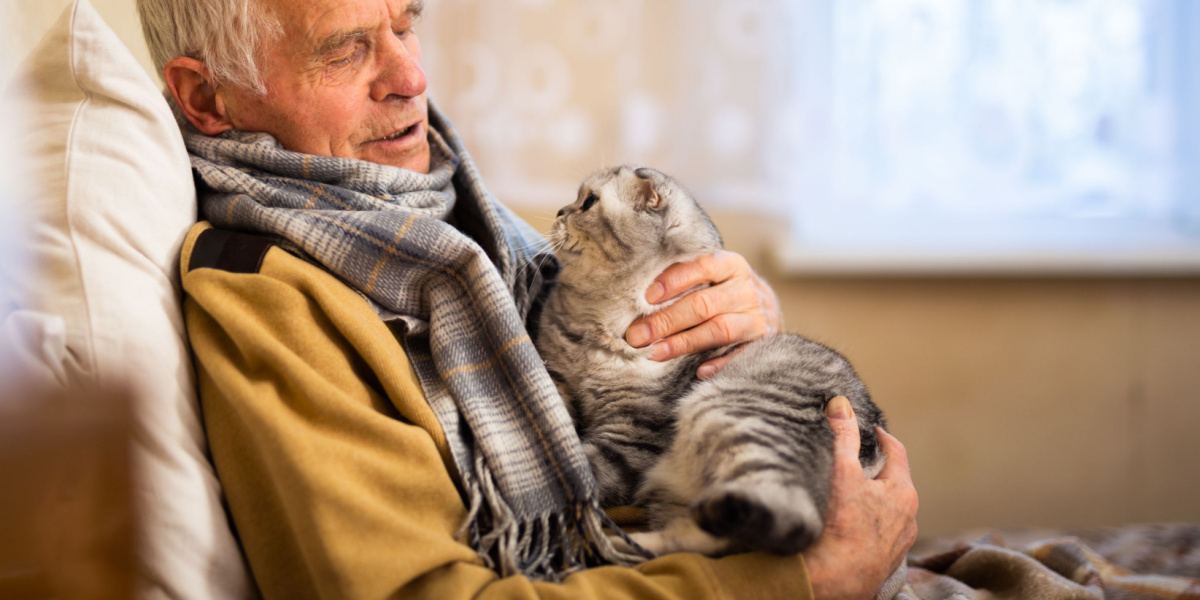
Cats have incredibly tight bonds with their human owners and form close connections for life. As they spend so much time with you, they probably get to know your habits, moods, and body language. So you might be wondering, are they sensitive enough to recognize when you’re sick?
Cats are extremely sensitive animals and have very close bonds with their owners. They can small chemical changes in humans and recognize changes in body language and facial expression. A combination of these can help cats detect when their owners might be suffering from an illness.Key Takeaways
Many people report anecdotally that cats have sensed their disease before they knew themselves, but is it true? Keep reading to find out how and what they might be able to sense when it comes to their cat owners.
Can Cats Sense Physical Illness?
Cats have a famously refined sense of smell and it has been found that they can detect pheromone changes coming from the human body.
Pheromones are secreted chemical that triggers a social response in members of the same species. Pheromones are very similar to hormones, just secreted outside of the body!
When people get ill and the decomposition of cells causes chemical changes in the body, it is well evidenced that cats can sense the hormonal changes using their olfactory pathway.
What Diseases Can Cats Sense?
1. Cancer
This might vary depending on what sort of cancer and how developed it is, but tumors will certainly change the composition of affected cells and organs, and this can cause chemical changes in the body. As mentioned above, cats have an acute sense of smell for changes in hormones and pheromones (hormones external to the body), and could well be able to pick up on these changes in a human.
Other cancers might cause someone to act differently, such as a brain tumor affecting behavior or personality, or lung cancer affecting someone’s breathing and the amount they cough. Cats will certainly recognize these changes in their owner’s body language and behavior.
2. Heart Attack
At the point a heart attack strikes, it is incredibly painful. A human suffering from a heart attack might cry out in pain and collapse. Cats will certainly recognize a human in pain as they are very good at reading facial expressions and especially when they are accompanied by vocalization. Cats that lay close to you or sit on your lap can detect an irregular or quickening heartbeat prior to a heart attack.
3. Hypertension
Hypertension is the medical term for high blood pressure. This is often accompanied by shortness of breath and an increased heart rate. Your cat will certainly be able to notice if your respiratory rate is increased and if they lie over your chest to cuddle, there’s a good chance they will be able to feel your raised heart rate.
Can Cats Sense Mental Illness?
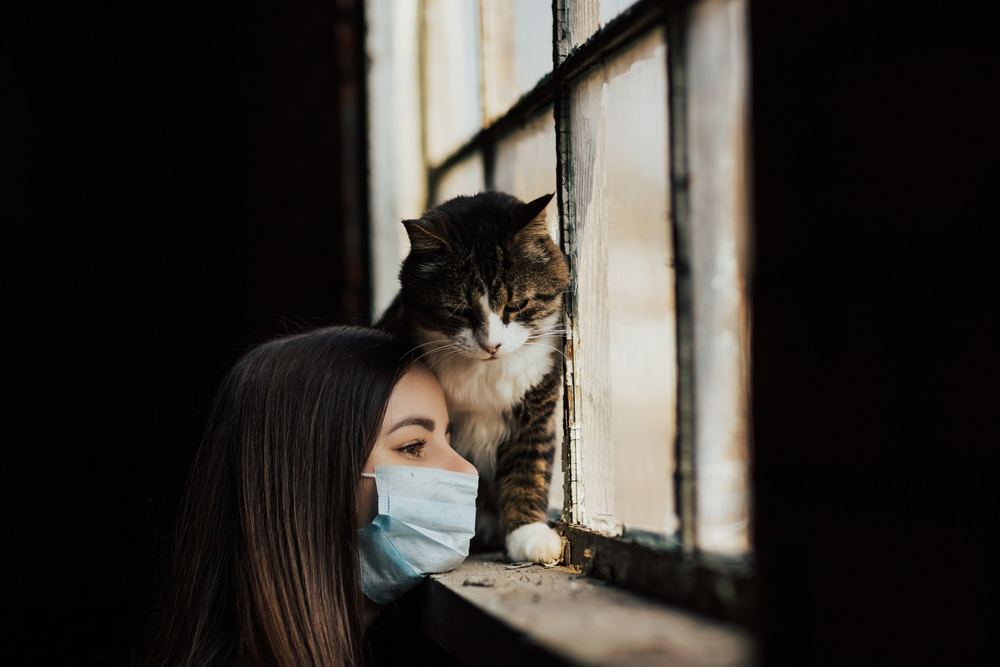
Cats are well versed in non-verbal communication such as body language and facial expressions
Cats are extremely clever at picking up on changes in body language, facial expression, and mood. And there is scientific evidence to suggest that cats can recognize human emotions such as anger or happiness. Therefore if their owner is suffering from any mental illnesses such as anxiety or depression, it is highly likely they will be acting abnormally and their cat will pick up on this due to the strong bond they have with their owners.
Cats might mimic changes in mood, or become more attention-seeking if they notice you’re not feeling yourself. A cat’s behavior is often a reflection of your own and the more stressed you are, then the more they can become too.
If they recognize a frowning or upset facial expression, they might try to cheer you up and provide comfort such as snuggling and rubbing up against you.
Do Cats Tell You If You’re Sick?
Cat owners have regularly reported behavioral changes in their cats when they or loved ones have been sick. Anecdotal evidence shows that cats often give people extra attention, become clingy, and started meowing, purring, and cuddling a lot more than they normally would.
If family members become stressed about a serious deterioration in the health of a cat owner then cats might too become stressed. This might look like inappetence, losing weight, or more vocalization.
Can Cats Sense Death?
There is little known yet about how cats might be able to sense death, but it is hypothesized that cats may be able to use their incredible sense of smell to detect when people’s organs are shutting down. A dying person might also give off different pheromones which their cats might pick up with their heightened senses. Cats have been known to detect other illnesses with their sense of smell so it is certainly plausible they can sense a chemical released just before humans die.
There was a cat recorded in the New England Journal of Medicine by a doctor caring for terminally ill residents in a nursing home in Providence, Rhode Island. As well as having the important role of companion to the residents and caregivers, Oscar, the cat, started to seem to have a sixth sense for when someone was about to die. He would jump onto a resident’s bed and snuggle with them, and sure enough, they would mostly pass away soon after.
The doctor of the facility hypothesized Oscar had an acute sense for pheromone changes in the patients or he could sense changes in body temperature, as people start to become colder when they are nearing death.
The Bottom Line
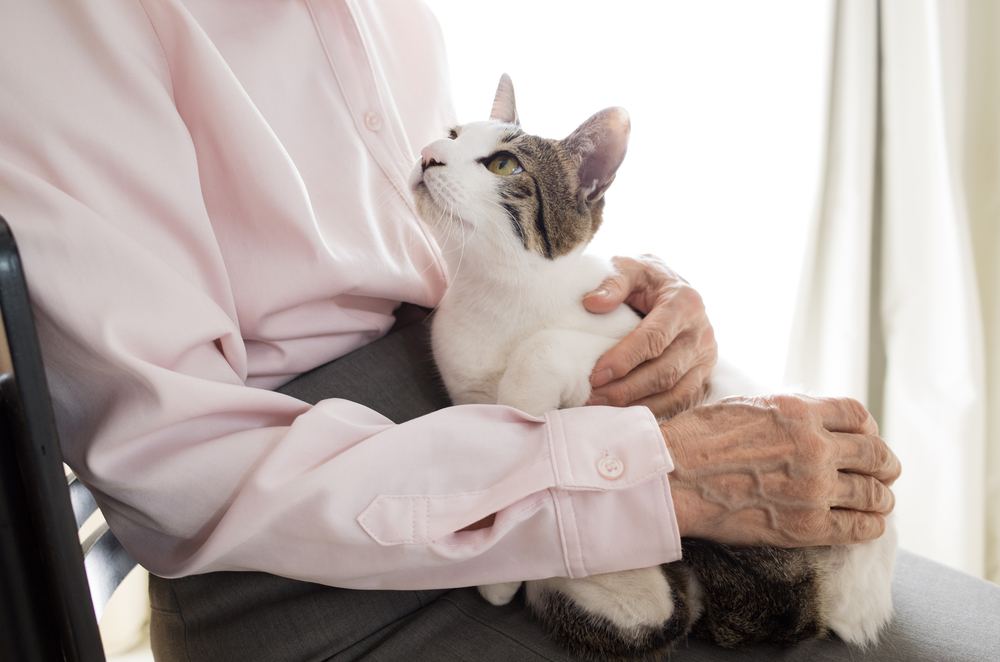
Cats form strong bonds with their owners, and may be able to detect subtle changes in their health
There are lots of ways cats can sense illness in humans, be it by smelling chemical changes in the body causing a shift in pheromones, or recognizing subtle changes in body language, facial expression, or even body temperature.
Cats are extremely sensitive animals and their close bond with their owners probably allows them to detect very small changes very quickly in their family members and tell them about it by showing them extra attention or mimicking mood changes. As shown by Oscar, they can be incredibly accurate!
Also Read: How To Have A Better Relationship With Your Cat
Frequently Asked Questions
Why do cats lay on you when you’re sick?
Cats may recognize mood and body language changes when you’re not feeling well and reflect that in their own body language. They may show they care or are worried about you by becoming more clingy and snuggly.
How do cats act when you are sick?
Cats might give you more attention than normal such as rubbing up against you more often or being very cuddly. You might hear them become more vocal as well so you’ll hear them purr or meow more than usual.
Why do cats act differently when someone is sick?
Cats might smell changes in their owner’s pheromones when they’re ill due to changes in the body’s chemicals. Due to cats having such a tight bond with their owners, they’ll be able to recognize when you’re not acting yourself either. These changes prompt them to act differently.
-
Vitale Shreve, K. R., et al (2017) Stress, security, and scent: The influence of chemical signals on the social lives of domestic cats and implications for applied settings. Applied Animal Behaviour Science, Vol 187: 69-76. Retrieved January 20, 2023
-
Quaranta, A., et al. (2020) Emotion Recognition in Cats. Animals (Basal), 10(7): 1107. Retrieved January 23, 2023

